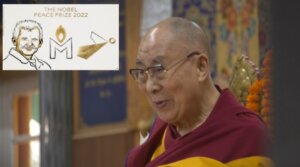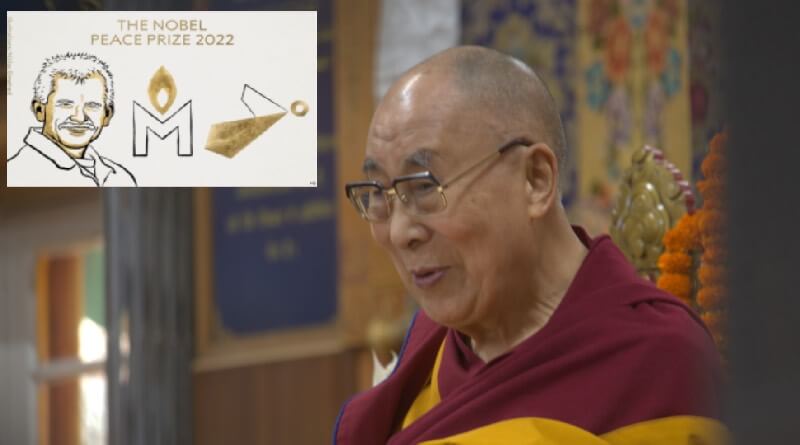Dalai Lama congratulates 2022 Nobel Peace Prize winners

DHARAMSALA, 10 Oct: The Nobel Committee has highlighted the importance of civil society in promoting fundamental human values of peace, freedom and democracy, says His Holiness the Dalai Lama as he congratulated the 2022 Nobel Peace Prize winners, human rights advocate Ales Bialiatski from Belarus, the Russian human rights organisation Memorial and the Ukrainian human rights organisation Center for Civil Liberties.
Congratulating the 2022 Nobel Peace Prize winners, the Dalai Lama has said that “Each of them recognises that all human beings have a right to freedom from want and freedom from fear and that human rights are inclusive, interdependent and universal.”
The Norwegian Nobel Committee’s decision to award the Nobel Peace Prize for 2022 to one individual and two organisations, is a recognition of their contribution, the Tibetan Nobel laureate has said and added: “by recognizing their contribution, the Nobel Committee has shone a clear light on the importance of civil society in promoting fundamental human values of peace, freedom and democracy.”
The octogenarian Tibetan leader further said that “today, the values of democracy, open society, respect for human rights, and equality are becoming recognized as universal values”, and that ‘there is an intimate connection between democratic values and the fundamental values of human goodness.”
“Where there is democracy there is a greater possibility for citizens to express their basic human qualities. Where these basic human qualities prevail, there is also a greater scope for strengthening democracy. Most important of all, democracy is also the most effective basis for ensuring world peace”, he added.
The Dalai Lama stated that our rich diversity of cultures and religions should help to strengthen fundamental human rights in all communities across the world as he reasoned that “underlying this diversity are basic human principles that bind us all together in the oneness of humanity.”
“The question of human rights is so fundamentally important that there should be no difference of views about it. We all have common human needs and concerns. We all seek happiness and try to avoid suffering regardless of our race, religion, gender or social status.”
The Dalai Lama concluded by welcoming the three recipients of this year’s Nobel Peace Prize to the fellowship of Nobel Peace Laureates and added that he hopes “this award will serve as an inspiration for all, reminding us that addressing problems through dialogue and with humanity will bring all parties to a happy and mutually beneficial solution.”
The Norwegian Nobel Committee’s award citation stated that “the Peace Prize laureates represent civil society in their home countries. They have for many years promoted the right to criticise power and protect the fundamental rights of citizens. They have made an outstanding effort to document war crimes, human rights abuses and the abuse of power. Together they demonstrate the significance of civil society for peace and democracy.”
The committee further added that “it wishes to honour three outstanding champions of human rights, democracy and peaceful co-existence in the neighbour countries Belarus, Russia and Ukraine.”
“Through their consistent efforts in favour of humanist values, anti-militarism and principles of law, this year’s laureates have revitalised and honoured Alfred Nobel’s vision of peace and fraternity between nations – a vision most needed in the world today.”
Ales Bialiatski was one of the initiators of the democratic movement that emerged in Belarus in the mid-1980s. He has devoted his life to promoting democracy and peaceful development in his home country.
Government authorities have repeatedly sought to silence Ales Bialiatski. He was imprisoned from 2011 to 2014. Following large-scale demonstrations against the regime in 2020, he was again arrested. He is still detained without trial. Despite tremendous personal hardship, Mr Bialiatski has not yielded an inch in his fight for human rights and democracy in Belarus.
The human rights organisation Memorial was established in 1987 by human rights activists in the former Soviet Union who wanted to ensure that the victims of the communist regime’s oppression would never be forgotten.
Nobel Peace Prize laureate Andrei Sakharov and human rights advocate Svetlana Gannushkina were among the founders. Memorial is based on the notion that confronting past crimes is essential in preventing new ones. The group has documented some of the crimes committed under the Soviet Union’s Stalinist regime.
The Center for Civil Liberties was founded in Kyiv in 2007 to advance human rights and democracy in Ukraine. The centre has taken a stand to strengthen Ukrainian civil society and pressure the authorities to make Ukraine a full-fledged democracy. To develop Ukraine into a state governed by rule of law, the Center for Civil Liberties has actively advocated that Ukraine become affiliated with the International Criminal Court.
Established in 1895, the Nobel Peace Prize is one of the five Nobel Prizes established by the will of Swedish industrialist, inventor and armaments manufacturer Alfred Nobel, along with the prizes in Chemistry, Physics, Physiology or Medicine and Literature.





